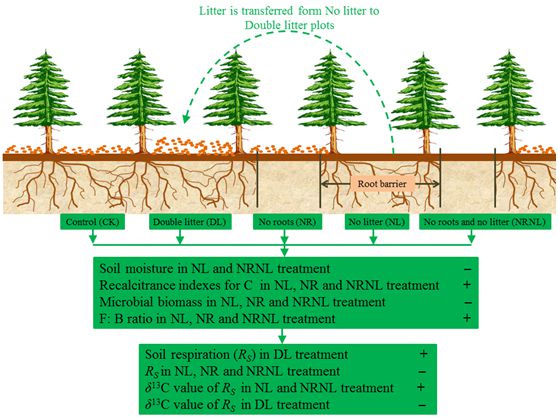Name:XiaoliCheng
Tell:
Email:xlcheng@fudan.edu.cn
Organization:Wuhan Botanical Garden
How Short-term Litter Input Manipulation Affects Soil Respiration and Its Carbon-isotopic Signature?
2017-02-23
As the largest source of carbon (C) flux from terrestrial ecosystems to the atmosphere, soil respiration greatly regulates climate change. Even a small change in soil respiration can have a large effect on atmospheric CO2 with potential feedbacks to climate change. Many studies have related soil respiration to global change, but how abiotic and biotic factors interactively affect soil respiration remains unknown.
Under the supervision of Prof. CHENG Xiaoli, WU Junjun from Wuhan Botanical Garden conducted a Detritus Input and Removal Treatment (DIRT) experiment in a coniferous forest (Platycladus orientalis (Linn.) Franco) ecosystem of central China to investigate the impact of above- and belowground litter input on soil respiration and its carbon isotope signature.
Soil respiration was susceptible to the decrease in litter inputs but relatively resistant to litter increase. It decreased by 31.9%, 20.5% and 37.2% in treatments with no litter (NL), no roots (NR) and no roots and no litter (NRNL), respectively, but increased by 9.1% with the double litter treatment compared to the control (CK) treatment.
The recalcitrance index of C (RIC) and the relative abundance of fungi increased under NL, NR and NRNL treatment. The carbon-isotopic signature of soil-respired CO2 was enriched under NRNL treatment and was slightly depleted under DL treatment compared to the CK treatment.
Soil temperature and moisture are the main abiotic drivers for soil respiration. The soil respiration rate and its carbon-isotopic signature showed similar seasonal patterns among treatments with higher soil respiration rates and lower δ13C values of soil-respired CO2 in the summer compared with other seasons.The relationship between soil respiration and soil moisture was fitted with a polynomial model: higher soil respiration corresponded to moderate soil moisture and the δ13C value of soil-respired CO2was negatively correlated with soil temperature and water content.
Basal soil respiration was positively related to labile C and microbial biomass and negatively correlated related to RIC and the fungi-to-bacteria (F: B) ratio, whereas the δ13C value of soil-respired CO2 was negatively correlated with soil temperature and water content.
Results suggest that short-term litter input manipulation can affect soil respiration by altering substrate availability and microbial community structure and can impact the carbon-isotopic signature of soil-respired CO2 possibly due to changes in the components of soil respiration and soil microclimate.
Results have been published in Applied Soil Ecology entitled “Does short-term litter input manipulation affect soil respiration and its carbon-isotopic signature inaconiferous forest ecosystem of central China?”.
This research was financially supported by the National Natural Science Foundationof China, and the Strategic Priority Research Program B of the Chinese Academy of Sciences.

Impact of litter input manipulation on soil respiration and its carbon isotope signature (Image by WU Junjun)